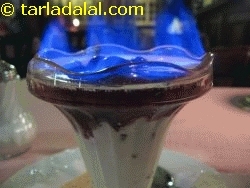flambe
Last Updated : Jan 30,2018
Flambe Glossary |Health Benefits, Nutritional Information + Recipes with Flambe | Tarladalal.com
Viewed 10098 times

Description
The flambé technique is often employed tableside at expensive restaurants for a dramatic touch. As extravagant as flambé dishes appear, they are easy enough to make at home and far less expensive. Impress your family and guests with a variety of flambé foods from salads to desserts. The term flambé is French for "flaming" or "flamed." The food is topped with a liquor, usually brandy, cognac, or rum and lit afire. The volatile alcohol vapor burns with a blue tint, leaving behind the faint flavor of the liquor or liqueur. This technique is used by chefs in the kitchen to burn off the raw alcohol flavor from a dish as well for dramatic flair at the table. Only liquors and liqueurs with high alcohol content can be used to flame foods, and those with a higher proof will ignite more readily.
Beer, champagne, and most table wines will not work. Liquors and liqueurs that are 80-proof are considered the best choices for flambé. Those above 120-proofs are highly flammable and considered dangerous. The liquor must be warmed to about 130 degrees F., yet still remain well under the boiling point, before adding to the pan. (Boiling will burn off the alcohol, and it will not ignite.) Always remove the pan from the heat source before adding the liquor to avoid burning yourself. Vigorously shaking the pan usually extinguishes the flame, but keep a pot lid nearby in case you need to smother the flames. The alcohol vapor generally burns off by itself in a matter of seconds.
Culinary Uses
· Use a flambé pan with rounded, deep sides and a long handle.
· Do not pour liquor straight from the bottle to the hot pan.
· Choose liquors or liqueurs that are complimentary to the food being cooked, such as fruit flavored brandies for fruits and desserts and whiskey or cognac for meats.
· Do not carry a lighted dish to the table. The liquid could splash out of the pan, resulting in burn or fire hazard.
· The food to be flamed must also be warm. Cold foods may cool down the warm liquor to a point where it will not light.
· For desserts and fruits, sprinkle with granulated sugar before adding the warmed liquor and lighting.

Soya

Missed out on our mailers?
Our mailers are now online!
View Mailer Archive
Privacy Policy: We never give away your email
REGISTER NOW If you are a new user.
Or Sign In here, if you are an existing member.

If your Gmail or Facebook email id is registered with Tarladalal.com, the accounts will be merged. If the respective id is not registered, a new Tarladalal.com account will be created.
Hi,

Click OK to sign out from tarladalal.
For security reasons (specially on shared computers), proceed to Google and sign out from your Google account.